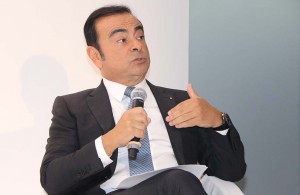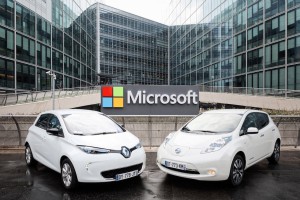
Renault-Nissan Chief Carlos Ghosn has said that partnerships are likely in the coming age of the connected car.
Under Carlos Ghosn, the Nissan-Renault alliance has leaned forward in areas such as the development and sales of electric cars and autonomous vehicle technology even when the returns have been scant.
Ghosn, however, also has been open to alliances of various kinds and Ogi Redzic, the executive overseeing connected vehicles at Nissan and Renault, said this week that developing a common technology for connectivity outweighs the risks of from a possible defect or a common breach in cyber security.
Redzic, senior vice president of the Renault-Nissan Alliance, said for automakers, connectivity with links to family, navigation aids and remote control of vehicles is an area where all automakers are looking for an edge.
The former executive at Motorola and Nokia, added that the alliance has begun hiring 300 people to build software applications for future cars, in addition to 300 employees at Nissan Motor Co. and 300 at Renault SA, already working on the effort to grab that leadership position.
He noted that the software used in cars becomes more sophisticated and costly, the benefits of partnerships – including with rivals – will become more apparent.
“There are some other companies which would like to build everything in-house, but … we are willing to partner when it makes sense,” Redzic said.
(Renault-Nissan inks deal with Microsoft. For more, Click Here.)
Nissan and Renault are developing a technology platform that will enable alliance vehicles, including those made by newest member Mitsubishi Motors Corp., to access cloud-based services including infotainment, car maintenance and remote control operation.
The automakers have been increasing investment in that area, announcing a partnership last month with Microsoft Corp. to develop connected car functions powered by Microsoft’s Azure cloud storage service. The pair have also acquired French software developer Sylpheo.
Automakers have been scrambling to partner with tech firms to mitigate the risk that self-driving cars and car sharing will trim demand for car ownership decades down the line.
(Nissan enjoys strong quarterly earnings. To get the details, Click Here.)
Redzic, however, declined to comment on the alliance’s strategy for car sharing. Renault has a partnership with Bollore, under which it produces electric vehicles for the French car-sharing service and supplies ultra-compact cars.
Renault also supplies its ultra-compact Twizy to rental companies. Redzic said the alliance was open to offering more vehicles to car service providers, noting that fleet sales were “a very healthy part of our business.”
“I don’t know if we would say ‘No’ to someone who wants to operate a service using a subset of our vehicles,” he said. “The question is whether we are going to operate a service on our own or if we’re going to work with a partner.”
(Nissan wants to redefine mobility. Click Here to see how.)
This year has seen a handful of automakers partnering car sharing service providers, including General Motors Co. and Lyft Inc., Toyota Motor Corp. and Uber Technologies Inc. and Volkswagen AG and Israel’s Gett.

